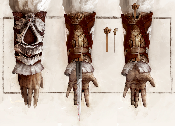Assassin's Creed II Review
|
|
See PixlBit's Review Policies

On 12/02/2009 at 10:28 PM by Nick DiMola A vast improvement over the already fantastic original title. |

Recommended for everyone.
While I've made this particularly clear in the past, I'll say it again now: I love Assassin's Creed. I purchased the first title for the 360 on somewhat of a whim, not expecting much, and completely fell in love with the game's mechanics and the beautiful environments. Of course, the game did suffer from some repetition problems, but given what I enjoyed about the game, it never bothered me to any great degree. As a matter of fact, I nearly completed 100% of the game, aside from finding all of the flags.

As such, when I tell you that Assassin's Creed II was my most anticipated game of the year, I don't exaggerate one bit. Being my most anticipated game, my expectations for the title were set very high, especially with the game being set in Italy, the home of my heritage. I'm glad to report that Assassin's Creed II not only met my expectations, but completely surpassed them in almost every regard.
Those familiar with the first game will immediately start to recognize differences when they boot up the title. Assassin's Creed was not a very directed experience. For the most part, players were given a city or destination and forced to complete a certain set of tasks in order to perform the ultimate purpose of the memory sequence: assassinating the main target. This sophomore effort completely discards that structure in favor of a more Grand Theft Auto-like approach.

This change was unexpected on my part. Leading up to the release of the game, Ubisoft teased that the game would feature several new types of tasks, but never mentioned that the core progression would be altered. The change is extremely welcomed, as it creates for a much more interesting and story-driven experience. Players will always have a core mission to accomplish, but along the way they can stop and perform a number of unique (new) side missions.
The main story missions also have quite a bit of variety, requiring players to do everything from assassinations to eavesdropping. As a matter of fact, there are so many different types of missions, I never found myself categorizing them as a certain type, and neither did the game. As mentioned earlier, this is mostly similar to the Grand Theft Auto series, and the game is much better for sticking to this tried and true model.

Though the core structure of the game has changed, many of the staples from the first title have returned. Players will still find themselves climbing to the high points of each city to synchronize viewpoints, completing side missions for money, and finding plenty of collectibles. This time, rather than flags players will seek out feathers, of which 100 exist throughout all of the cities in the game.
Players are also treated to a metagame, which involves a villa and town owned by Ezio's Uncle Mario. As players seek out different items within the game, they will raise the value of the town and subsequently earn money. Players can also upgrade much of the town in order to earn more money and receive a discount on the various goods sold in town.

Assassin's Creed II offers a new inventory system as well. Armor sets and weapons can be purchased in order to increase health, as well as attack and defense strength. As mentioned before, these items will also increase the value of the town. Both the inventory system and the town metagame make for great goal markers throughout the game, giving players something else to strive for as they make their way through the story.
Yet another new addition to the game are the Assassin Seals. A total of six exist in the game and each are housed within very Prince of Persia: The Sands of Time-like environmental puzzles. I absolutely loved both seeking out these seals and performing the puzzles, each of which were extremely unique.

It should be noted that the game's controls have also been noticeably improved, allowing players to more accurately perform the desired move. Climbing is now more fluid, and towards the middle of the game players learn a jumping climb, which makes the task quicker to perform.
The most noticeable improvement to the controls comes within the fighting system and blending system. Blending is much more seamless now, and players will be cued by a small animation as well as a color palette change when they are blending.

Right from the get-go, players will notice how much better fighting is. This aspect is only amplified as players learn a multitude of new techniques throughout the game. Whereas the fighting felt both stiff and unvaried in Assassin's Creed, in Assassin's Creed II everything feels natural, and each battle can be approached differently depending on how players want to fight.
On a more personal level, I find the Italian setting to be far more intriguing and interesting than the Persian setting of the first game; each city felt more or less the same. Here, locations such as Venice, Tuscany, and Florence each provide for a vastly different experience. Of course, being an Italian the setting is naturally appealing to me, as is the culture and language, all of which is familiar.

Ezio's story is far more engaging as well. Players now fight to avenge their family and carry on their father's work, whereas Altair only sought to bring himself back in good graces with the Assassins. Furthermore, Ezio is a better character. He is emotive and full of charm and personality, characteristics that any person would naturally like to embody.
If you haven't gathered by now, I absolutely love Assassin's Creed II. Any possible complaint that I harbored in the first game was addressed in this fantastic sequel. It's not often that a game does that and more. I wholeheartedly recommend that everyone at least check out Assassin's Creed II; it's one of the best gaming experiences of the year, and possibly of the generation.









Comments